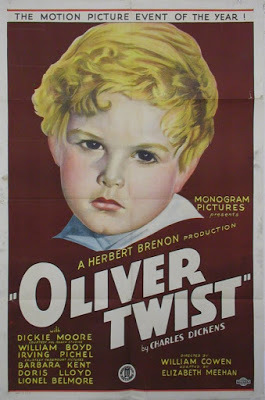Twinkle, Twinkle, Dickie Moore (What it's like to be a child star in Hollywood)

I don’t really know the film work of Dickie Moore, who died September 7 at age 89. Though the chubby-cheeked little boy got his start in silent movies, Moore’s heyday was the Depression era. He appeared in 19 motion pictures in 1932 alone. The following year, at the age of 6, he played the lead in a film adaptation of Dicken’s Oliver Twist. He was Marlene Dietrich’s young son in Blonde Venus, and shared the screen with Barbara Stanwyck in So Big, Walter Houston in Gabriel Over the White House and Spencer Tracy in Man’s Castle. By the age of twelve, he was a has-been, but later had the distinction of giving another former child star, Shirley Temple, her first screen kiss.
Moore was the rare child star of Hollywood’s Golden Age who managed to get a college education. After serving in World War II, he studied journalism at Los Angeles City College, then used his writing skills in running a public relations firm, Dick Moore and Associates, that lasted four decades. In 1984, he published a book I consider a classic. Its jaw-dropping title: Twinkle,Twinkle, Little Star (But Don't Have Sex or Take the Car). Far more than a memoir, this is Moore’s wide-ranging exploration of what it was like to be a top child actor in his own era. For the book, he interviewed many of his peers, including Jackie Coogan, Shirley Temple, Mickey Rooney, Jane Withers, Roddy McDowell, Margaret O’Brien, and Natalie Wood. All agreed that child stardom is an unnatural state. It may have its pleasures, but it leaves one ill equipped to enter the adult world.
The child stars of Moore’s generation tended to shoulder the burden of being their families’ sole means of support. Which meant that in a professional sense they needed to grow up quickly, and to know how to behave in an adult environment. On the other hand, in an era that prized innocence, they were kept artificially young by their parents and their studios. Puberty was seen as the enemy, and these kids often remained ignorant of anything as basic as their changing bodies. And most were kept in the dark about money matters, too, with the result that they were frequently taken advantage of by conniving hangers-on. (Jane Withers, in this and so many other ways, was a happy exception.) There was always stiff competition from other young wannabe stars, which is why ambitious stage parents (like Shirley Temple’s mom) tended to isolate their little darlings from their peers. Child stars, by and large, were lonely. And despite their fame, they lacked a strong sense of personal self-worth. That’s why as they grew up they tended to marry young, and badly.
Not all successful child actors resented their parents. But many did . . . for good reason. Fathers were often out of the picture, or were so dispirited by having children who took on the role of family breadwinner that they pretty much vanished into the woodwork. Diane Cary (once adored as Baby Peggy) acidly called showbiz moms “the saber-tooth tigers of the Hollywood jungle.” Jane Powell, the adorable girl-next-door blonde, once considered her mother “my girlfriend, my confidante. . . . I am amazed I didn’t see through her as a child.” Looking back, she recognized her mother as a shrewd and calculating woman, who drove her father away on the grounds that he wasn’t good enough.
The interviews conducted by Moore for this book had one happy outcome. He and Powell married in 1988 (it was her fifth try), and stayed together until his death.
Published on September 15, 2015 19:31
No comments have been added yet.
Beverly in Movieland
I write twice weekly, covering topics relating to movies, moviemaking, and growing up Hollywood-adjacent. I believe that movies can change lives, and I'm always happy to hear from readers who'd like t
I write twice weekly, covering topics relating to movies, moviemaking, and growing up Hollywood-adjacent. I believe that movies can change lives, and I'm always happy to hear from readers who'd like to discuss that point.
...more
- Beverly Gray's profile
- 10 followers



